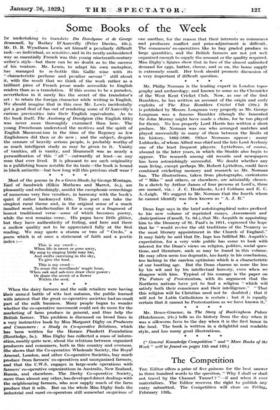their annual battle of wits last autumn, the, public learned
with interest that the great co-operative societies had no small part of the milk business. Many people began to wonder whether the co-operative movement could not do more for the marketing of farm produce -in general, and thus help the British farmer. This problem is, discussed on broad lines in a very instructive book by Miss Margaret Digby on Producers and Consumers : a Study , in Co-operative Relations, which has been written for the Horace Plunkett Foundation (Itoutledge, 5s.). Miss Digby has collected a mass of inform- ation, mostly quite new, about the relations between organized producers and consumers, both in this country and overseas. She shows that the Co-operative Wholesale Society, the Royal Arsenal, London, and ,other. Co-operative Societies, buy much produce from farmers' co-operatives and unorganized farmers, and that the C.W.S. engages in large-scale operations with farmers' co-operative organizations in Australia, New Zealand, 'Russia, and elsewhere. The Derby Co-operative. Society, more than almost any other, has developed direct dealings with the neighbouring farmers, who now supply much of the farm produce that it sells. But on the whole Miss Digby finds the industrial and rural- co-operators still somewhat suspicious of
one another, for the reason that their interests as consumers and producers conflict and price-adjustment is difficult. The consumers' co-operatives like to buy graded produce in large quantities, and the British farmers are not yet well organized enough to supply the amount or the quality required. Miss Digby's figures show that in face of the almost unlimited demand for eggs, butter, cheese, and so on, the home supply is- extremely small. Her book should promote discussion of a very important if difficult question.
* * * *








































 Previous page
Previous page